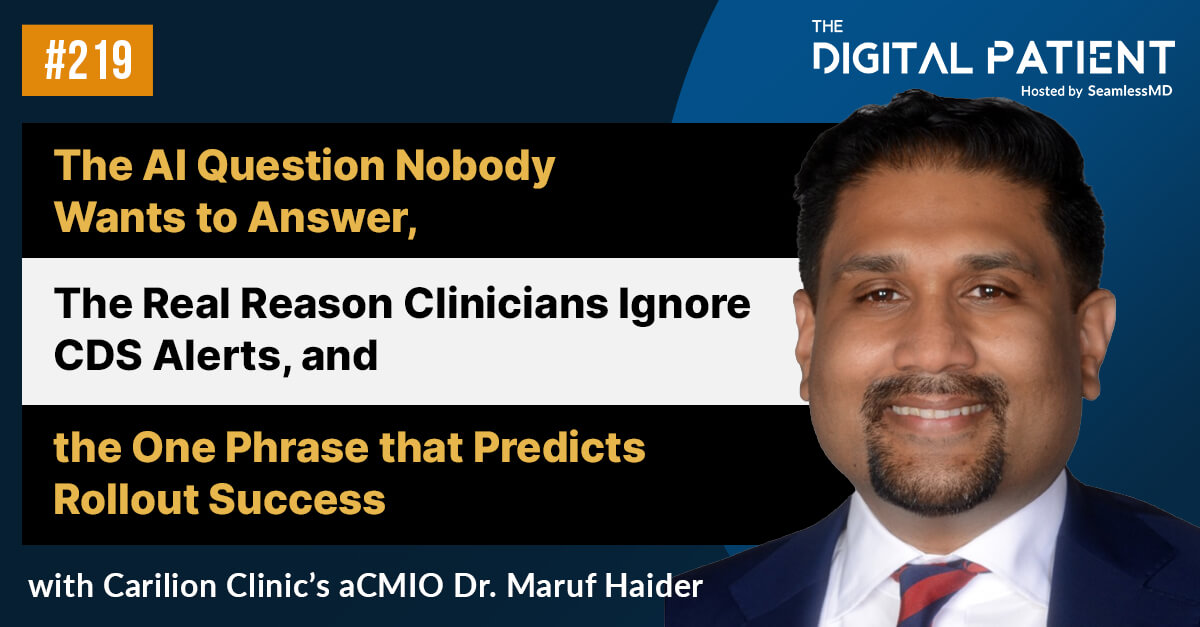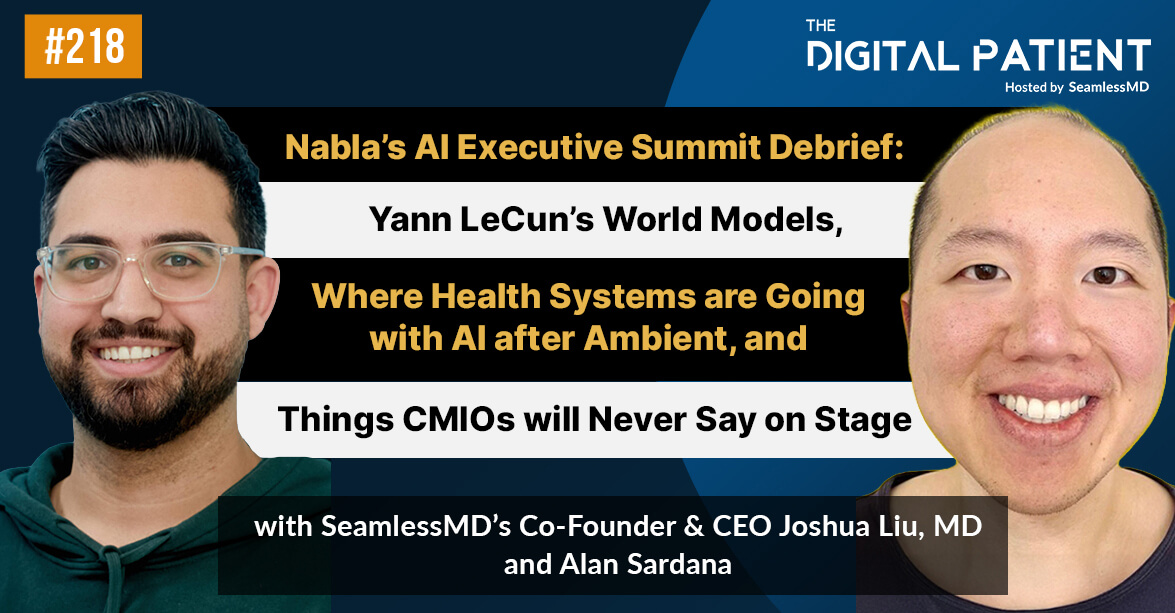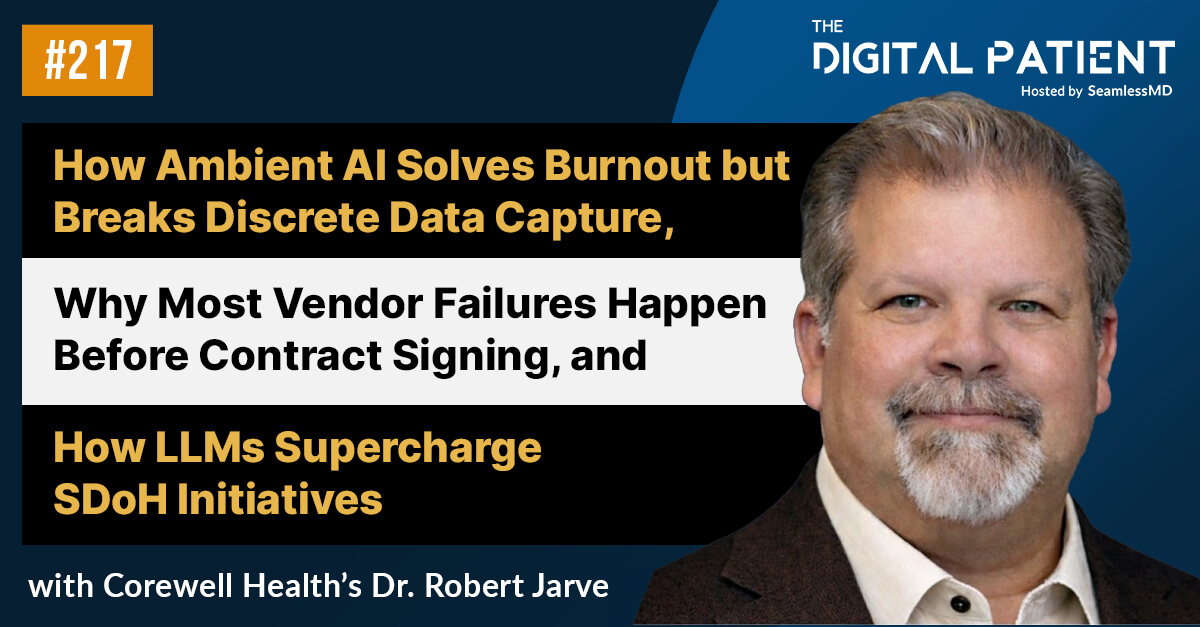Subscribe on: RSS | SPOTIFY | APPLE PODCAST | GOOGLE | BREAKER | ANCHOR
On this episode of "The Digital Patient" podcast, hosts Alan Sardana & Dr. Joshua Liu speak with Dr. Keith Woeltje, CMIO at Froedtert Health and the Medical College of Wisconsin, about "Conversational AI for Healthcare, Creating Learning Health Systems, Proactive Decision Support to Improve Patient Care, and more..." Click the play button to listen or read the show notes below.
Audio:
Video:
Guest(s):
- Dr. Keith Woeltje (@kwoeltje), CMIO at Froedtert Health & Medical College of Wisconsin
- Dr. Joshua Liu (@joshuapliu), Co-founder & CEO at SeamlessMD
Episode 101 - Show Notes:
[01:06] Why Dr. Woeltje completed an MD-PhD program after discovering an interest in medicine during grade school where he learned about the history of surgery and infectious diseases;
[03:30] How Dr. Woeltje became interested in medical informatics after taking a programming class during his last semester of college and discovering the field of clinical informatics while working as an infectious disease fellow;
[07:32] Why Dr. Woeltje emphasizes the importance of utilizing technology to improve patient care and outcomes, including proactive decision support through smart order sets and leveraging data to inform better solutions for patient safety and quality;
[10:44] Why embedding support tools into natural workflows is key to reducing friction in the adoption and sustainment of new tools in healthcare;
[12:44] Why healthcare teams sometimes let failed innovations continue because of a mindset that failure in medicine is unacceptable, and why Dr. Woeltje believes healthcare organizations need to define upfront what's working and what's not, learn from failures, and focus on things that are working instead of constantly trying to beat into submission a failed workflow or a failed innovation;
[17:39] How ambient voice technology has benefits for providers who like it, but it should not be sold to the C-suite as a way to generate revenue. It can help reduce provider turnover, which is a cost savings;
[19:34] How healthcare leaders can improve patient access by improving technology and user interfaces for telehealth visits, inviting others to visits, thinking about the continuum of care, and being thoughtful around workflow;
[23:14] How team-based care applies broadly and a lot of routine follow-up care is amenable to a team-based approach; for example, HIV care and routine follow-ups like blood pressure monitoring. Why reimbursement models hamper creative thinking more than the necessity of care delivery. Patients may prefer to see doctors, but this is likely to change over time as people get used to team-based care;
[29:39] How Froedtert Health switched to a new electronic health records (EHR) system and saw a temporary drop in patient experience scores after the go-live due to care providers being distracted and learning the new technology, but the scores returned to baseline shortly after; the lesson learned was that despite the temporary dip, if the switch to a new EHR is done right, the scores should rebound quickly with a net-positive outcome;
[33:01] How conversational machine learning is an iterative approach to machine learning that involves working with subject matter experts to account for all variables and generate answers that providers can feel confident in, as demonstrated in a project that investigated the risk factors for VTE in patients using data from the EHR;
[37:10] Why Dr. Woeltje is more excited about using AI and machine learning in visual applications such as radiology and diabetic retinopathy screening, where the focus is on improving patient care rather than worrying about liability;
[40:48] How Dr. Woeltje got involved with the First Robotics program, originally as a coach and eventually a judge for the First Lego League program, aimed at getting fourth through eighth graders involved in STEM and learning critical thinking skills;
[43:17] Why Dr. Woeltje sees robotics in surgery as a great application of technology to improve patient care and enable more specialized surgeries to be accessible remotely;
Fast 5 / Lightning Round:
- What is your favorite book or book you’ve gifted the most?
"Sourdough" by Robin Sloan
- Who is a person–dead or alive–you’d love to meet?
"William Gibson" - American Science-Fiction writer
- Bonus Q: Favorite Sci-fi Movie?
"The Fifth Element"
- Would you rather have Super strength, super speed, or the ability to read people’s minds?
"Super speed"
- What is something in healthcare you believe that others might find insane?
"That we're still using pagers and faxes."
- If you could travel back in time to any event or moment, what would it be and why?
"The moon landing."
.svg)










.png)
